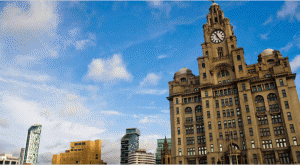 Liverpool is a stunning city. Looking out from the docks, over the Mersey and beyond to the Irish Sea, one cannot help but be moved by the sense of history that is encapsulated by this view from the heart of this proud old city. Into the city, through the port, influences and cultures have poured in from all over the world, giving Liverpool, not only an historically diverse population, but also an exciting dramatic edge, common to many major city ports in the world. At one time, Liverpool was viewed as the second most important city in Britain, with 40% of the world s trade passing through its docks. It was likened by one commentator to being the New York of Europe with its skyline of tall buildings, a reflection of the city s wealth in the mid to late nineteenth century. There are of course no more famous sons of the city than the Beatles, the Fab Four, who, by becoming the first globally successful pop group, firmly put Liverpool back onto an international stage in the sixties of the last century. They came to epitomise the Liverpudlian, with their dry wit and sense of fun. In fact the Beatles, along with other Merseybeat era groups, gave tremendous impetus to Liverpool becoming a major UK tourist destination. Tourism today is a significant element of the city s current economy, alongside that of the service sector, both public and private, and new media such as Sony s PlayStation R & D centre at Wavertree. Liverpool, like many British cities, has been through some tough times, particularly after the Second World War, however the city has undergone something of a renaissance in recent years and was selected as the European City of Culture in 2008.
Liverpool is a stunning city. Looking out from the docks, over the Mersey and beyond to the Irish Sea, one cannot help but be moved by the sense of history that is encapsulated by this view from the heart of this proud old city. Into the city, through the port, influences and cultures have poured in from all over the world, giving Liverpool, not only an historically diverse population, but also an exciting dramatic edge, common to many major city ports in the world. At one time, Liverpool was viewed as the second most important city in Britain, with 40% of the world s trade passing through its docks. It was likened by one commentator to being the New York of Europe with its skyline of tall buildings, a reflection of the city s wealth in the mid to late nineteenth century. There are of course no more famous sons of the city than the Beatles, the Fab Four, who, by becoming the first globally successful pop group, firmly put Liverpool back onto an international stage in the sixties of the last century. They came to epitomise the Liverpudlian, with their dry wit and sense of fun. In fact the Beatles, along with other Merseybeat era groups, gave tremendous impetus to Liverpool becoming a major UK tourist destination. Tourism today is a significant element of the city s current economy, alongside that of the service sector, both public and private, and new media such as Sony s PlayStation R & D centre at Wavertree. Liverpool, like many British cities, has been through some tough times, particularly after the Second World War, however the city has undergone something of a renaissance in recent years and was selected as the European City of Culture in 2008.

